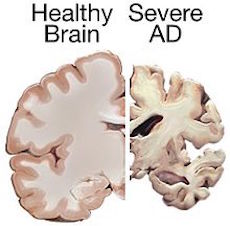Top Alzheimer’s Disease researchers are becoming more confident about producing effective pharmaceutical treatments.
If they do, of course, it would obviously have huge effects on the healthcare system.
Reports reports that new experimental drugs from Eli Lilly and Co. and Biogen “have shown promise in slowing down the progression of the mind-wasting disease, attracting the attention of investors and patients.
“Those drugs are still very early in their development and could still join the scrap heap. But the field has gained a major understanding of how the brain changes with Alzheimer’s and better insight on how and when to intervene medically.”
The Lilly and Biogen drugs block beta amyloid, a protein that causes toxic brain plaques that are markers of the disease.
“‘This year is different because multiple mechanisms are being explored and there’s a tremendous revival of faith in the anti-amyloid approach,’ said Reisa Sperling, M.D., director of the Center for Alzheimer’s Research at the Harvard Medical School, told Reuters.
An officially estimated 5 million people have the disease in the United States, but some experts think that the real number is considerably higher. The Alzheimer’s Association projects that up 28 million Americans will develop the disease by 2050 and eat up 25 percent of Medicare spending by 2040.
That is, unless effective drugs are found.




